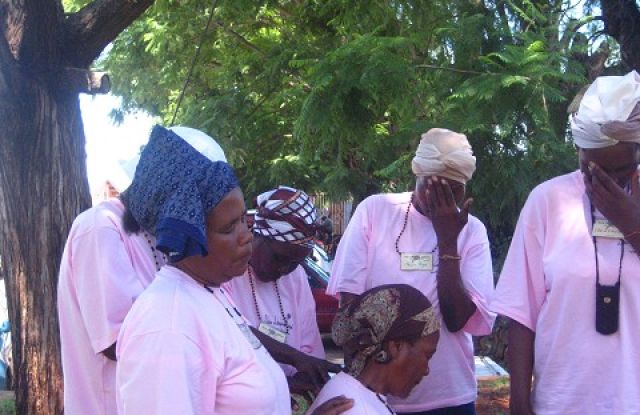What to Do With an Unsafe Family Member

Welcome to Christmas 2017. It’s an interesting time with intersecting relationships. Blended families and extended families and oddball friends find their way into your living room as the Hallelujah chorus swells in the background. And everyone knows what could happen if ghosts of unpleasant Christmases past come to visit.
You’ve worked so hard to create a safe place for your family and then during this one special time of the year, you open your doors to people in your life who have been unsafe.
All of us struggle at one time or another with unsafe family members (people who have been emotionally manipulative or abusive, not just those who have hurt your feelings).
Knowing that the stakes are high and that relationships have been fragile in times past, we put on our best behavior and then hold our breath. We hope that no one will transgress the boundaries we’ve set and that we can all exhale at the end of the day.
Last night I was talking to one of our guests about Pablo Escobar and the Colombian cartel. We had a nice evening and I went to bed, only to wake from a dream where I was running to escape from the cartel who were intent on killing me.
Being human is hard. We humans are not superheroes. We are flawed and vulnerable. Not hiding can be hard.
Here are three strategies to consider:
1. Assess the cost
Is the relational wreckage in your rearview mirror part of a pattern or was it a one-off? Perhaps you are naive. Perhaps you struggle with discernment. You may need more help “reading people” than you’ve had in the past. Or perhaps you don’t trust yourself. Feel free to ask for help.
Ask those you trust to discern the difference between a risk worth taking and one that is unacceptable.
Also, assess whether the relationship in question is worth it. Is God leading you in that direction? Take time to pray about it and ask God to direct you.
2. Anticipate a response
We all make mistakes, but when we hurt one another, it’s what we do on the other side of that hurt that will show how much we care about the relationship. You want to trust those who are trustworthy. A friend shows themselves to be trustworthy by caring about how they impact you.
You can look at how you feel after having been with them to know if they care. Do you find yourself rehearsing what you are going to say to them the next time you’re together because you’re afraid you’ll come off in the wrong way? Do you feel accepted?
3. Have the hard conversation
Part of taking down the big walls around your heart requires that you learn how to say the hard things that protect your heart. Don’t catastrophize. So you had a disagreement along the way. It’s not the end of the world.
Maybe you were just practicing a needed boundary and the person likes you better as a doormat. That’s OK.
Jesus asked us to “love one another.” But love can be hard when we feel wounded. While boundaries are an important part of living a stable life, living with your guard up all the time is stressful.
God wants you to love and be loved. It’s essential to living a full life. Maybe holding your breath is the best option. Or maybe it’s time to establish boundaries. Or maybe it’s time to move beyond boundaries and seek a breakthrough.
We worship the Prince of Peace. But peacemaking is hard work. I pray courage for you.



I found myself always picking up the pieces of a manipulative sister and getting nowhere. God used Matt 10:36 one day and spoke loud and clear. I saw I
Would much rather try and LOVE
Than take the steps in the way I
Thought God was leading. “A
Person’s enemies will be those of his own household” was the verse. My Sweet Heavenly Father said… “I…the great I AM..
Have had enough”. It took time
For me to realize the freedom and ENERGY I would enjoy down the road. He spared me.
It is NOT the answer for everyone. It was NOT easy. But it was so personal and I saw a side of MY FATHER I had never experienced before. “Be still” is a good place to start. Live obediently. Let Him pick the solution and the way….points from Seth above are wisdom.
What is Gods answer for you?
Sounds like you processed this well, Debra. Hope the rest of the holidays go well for you.
I would love to know how Jesus dealt with his brothers who said that he was drunk and crazy. That would help a lot. My relative will always think that I am the problem and talking does no good because it is crazy talk. At least I know that Jesus would understand…
We may not have that, but we do see him responding when his relatives and his disciples were inappropriate at other times:
When he said, “Who is my mother, and who are my brothers?”
When Peter wanted to build booths on the mount of Transfiguration.
When James and John’s mother asked, “Grant that one of these two sons of mine may sit at your right and the other at your left in your kingdom.”
Seth! What a great topic! One that is often avoided or one that slips into the subconscious. Living in a comfort bubble is too similar to living in a fear fortress.
This is a well written blog that will likely help a lot of people.
Another book coming any time soon? Aloha
Lindsay – good to hear from you. How is life as a married woman? How are you? Catch me up.
No books on the horizon. People don’t read much anymore.
Hi Seth
This christmas I had to endure dealing with an un safe family member ,a friend asked me money to enable to travel to the city where I live which I complied and sent her enough fare.However when I expected to see her in town she never showed up instead she called demanding more money.Later I discovered she had not travelled all she wanted was money from
me and I could not send more she resorted to hurling abuses to me as her christmas present to me.I insisted to see her physically we talk.
Life as a married woman is exciting and trying, depending on the day lol. It’s true that marriage highlights your greatest flaws, but I’m finding that’s kind of the beauty of it. Its like a life long feedback session. Lol
He’s amazing though, undoubtedly one of those blessings God had stored up for me. I am grateful. We’ve been travelling between LA and Hawai’i and Washington State, so he’s officially met my whole family. In fact, we just went shooting in the snow with my dad and brother. Its definitely a 180 for him to be here and he’s adapting well.
We’re moving to Denver on New Years so he can play semi pro rugby which will hopefully lead to a spot on the USA rugby team within the next year or two. Community and work will be the next thing for us to find.
Hows your family? And how was your Christmas?
P.S. World Racers still read 😉
I went home for my sister’s wedding between Months 6 and 7. Despite how hard it was to get on the plane and the concern of spreading lice to every single person I know… it was actually a gift because I could see the feedback given to me in my family. Things started to make sense. That’s kind of the approach I take with family gatherings now: does it make more sense why I struggle with what I struggle with or why my strengths are what they are? For a long time I wondered (and sometimes still do), if any family members are “safe” in the sense that I won’t fall back into the things I’ve found freedom from because of the influence of those in my world.
I like that – counselors would say that it’s a way of addressing our “family systems.” Understanding why we do what we do in part as a response to the behavior of others in our family.